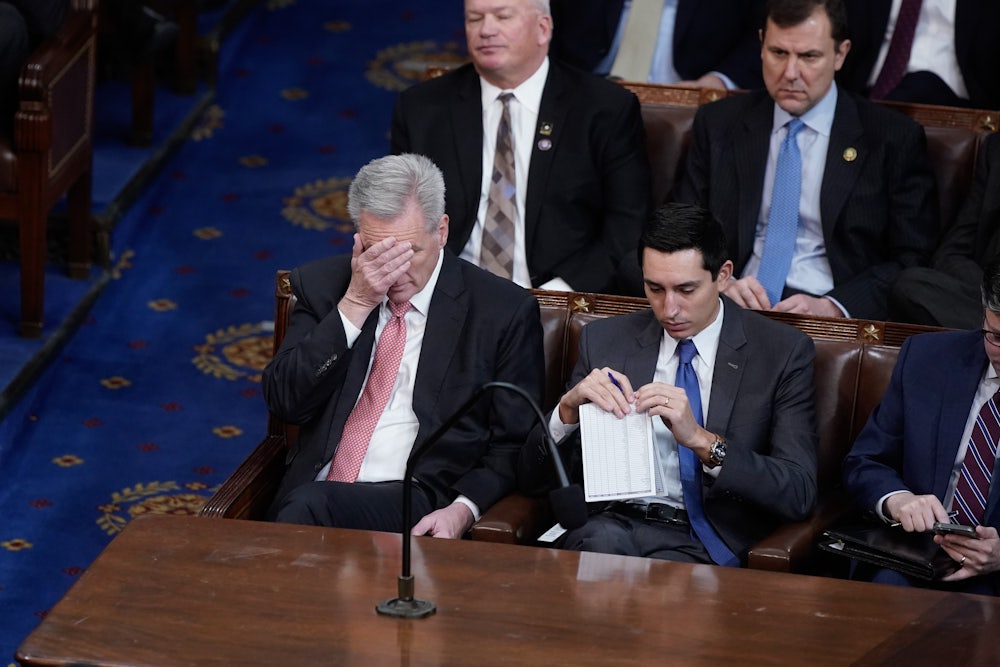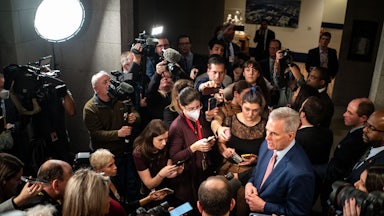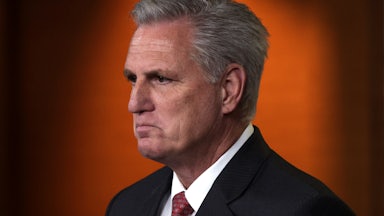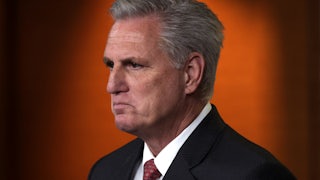The open stone doorway leading to the House speaker’s office remains unmarked, although the outline of the previous plaque marking the space as Nancy Pelosi’s domain is still visible. The Republican leader, Kevin McCarthy, has moved into the office, a customary action by the presumptive speaker that nonetheless feels somewhat presumptuous.
After Wednesday’s six failed attempts to win the majority of the House’s vote for speaker, McCarthy persisted in his quest for the gavel on Thursday, piling up five more unsuccessful votes to his name. He and his supporters have continued to wheedle the 20-odd Republicans who’ve steadfastly opposed his candidacy for speaker, offering a package of potential rules changes in exchange for their votes. McCarthy and his allies were at least outwardly optimistic by the time the House adjourned on Thursday evening; progress had been made in negotiations, they argued, if not in the actual vote tallies of the day.
“The entire conference is going to have to learn how to work together. So it’s better that we go through this process right now, so we can achieve the things we want to achieve for the American public,” McCarthy told a crowd of reporters after the House adjourned, with considerable zen for a man who lost five consecutive votes for speaker due to opposition from a faction within his own party. “So if this takes a little longer, and it doesn’t meet the deadline, that’s okay. Because it’s not how you start, it’s how you finish.”
Like every other member of the House, McCarthy is currently a representative-elect—without a speaker, they cannot be sworn into office. The uncertainty over McCarthy’s political future mirrors the existential limbo of the House as whole: no representatives, no committees, no rules to govern the floor, even those that govern C-SPAN’s cameras. Half of the legislative branch is immobilized, and there is no end in sight.
“I think what you’ll see today is the same until we finish everything up,” McCarthy told reporters before the House reconvened, accurately predicting another day of stalemate for the increasingly exhausted members-elect. At noon, members voted for the seventh time to elect the speaker. As freshman Representative-elect John James noted in his speech renominating McCarthy, the Republicans’ greatest victory thus far had been the narrowly decided vote to adjourn on the previous evening. “It was a small victory, but didn’t it feel good?” James said, to vocal Republican approval. (It’s unclear whether a 216–214 vote to leave the building would be so lauded under any other circumstances; they had a clearer margin of victory in the vote to adjourn on Thursday evening.)
There were some key developments: Some of the crew of anti-McCarthy defectors switched their vote—to Kevin Hern, the chair of the Republican Study Committee, in the eighth vote. In the seventh and eighth votes, Representative-elect Matt Gaetz voted for “Donald John Trump” as speaker, leading the former president to lose yet more elections. (On the ninth ballot, Gaetz switched his vote again, joining the pro-Hern faction; by the eleventh ballot, however, he was back to nominating and supporting Trump.)
The occasion was mostly an exercise in performative politics, with lengthy nominating speeches and partisan standing ovations. When Representative-elect Dan Bishop nominated Representative-elect Byron Donalds, who is Black, for speaker ahead of the seventh vote, he noted that “yesterday we could have elected the first Black speaker of the House of Representatives.” Donalds received 20 votes in all three speaker votes on Wednesday. Unwilling to waste a layup, Democrats leapt to their feet to clap for Democratic leader Hakeem Jeffries, who is also Black, and has consistently won the most votes of any candidate for speaker (albeit not enough for a majority).
But if this week has provided ample opportunity for Democrats to publicly exult in their own unity, they are still very much in the minority and will have next to no power when the House is (eventually) sworn in. “We’re having an internal fight. It’s being displayed, I wish it wasn’t necessarily being displayed for the American people to see, but I can tell you this: When this is over and done with, I know which side of the House is going to be laughing,” Representative-elect Andy Biggs, one of the anti-McCarthy defectors, said in remarks nominating Donalds before the eighth vote for speaker.
The simmering irritation of members-elect at the stalemate began to boil over as Wednesday dragged into Thursday. Entering into the third day of stalemate, “frustrated” was too mild a word for Representative-elect Steve Womack of Arkansas. “There’s not a word. Webster hasn’t come up with a word yet,” Womack told reporters. Representative-elect Mark Amodei commented that “well, nobody’s died yet.”
A group of Republicans who had served in the military gathered for a press conference on Wednesday evening, arguing that the lack of a speaker could compromise national security. Representative-elect Mike Gallagher, who will be a member of the Intelligence Committee when committees are actually organized, testily noted that he had been unable to meet with the joint chiefs of staff as planned that day because—as a member-elect who has not actually been sworn in yet—he does not have clearance. Speaking to reporters in his first-ever press scrum outside of the House chamber on Thursday, Gallagher wondered aloud if Congress could declare war at this moment. (They are members-elect.)
“I think people should be worried. What if it was an emergency or a national crisis, and Congress had to act? I mean, we can’t,” said Representative-elect Jim McGovern, the incoming ranking member of the Rules Committee. He also observed that, at a certain point, members-elect and committee staff won’t be paid. Another soon-to-be ranking member, Representative-elect Richard Neal of the Ways and Means Committee, took the uncertainty in stride: “People are still calling me Mr. Chairman. It works for me.”
Other members expressed frustration that they could not conduct constituent work because of the recalcitrance of the anti-McCarthy faction. Representative-elect Dan Crenshaw told reporters after the eleventh vote that “there’s certain members there in that 20 that literally have no idea what they’re asking for,” although he said that some were working for rules changes in good faith. “It’s frustrating because it’s stuff that honestly would have been very easy to just hash out,” Crenshaw said.
But Gallagher did say between the seventh and eighth votes that it was “kind of cool” to have members forced to stay on the floor for long stretches of time. “Nobody’s rushing out to a fundraiser,” Gallagher said. “I wonder if the lesson from that is that we should do that on a more regular basis.” (Somewhat delighted by his first experience with a scrum of reporters as a newfound member of the majority, even as he was literally backed into a corner next to the chamber doors by the growing crowd of journalists, Gallagher enthused: “This is fun!”)
Gallagher may be gazing at the silver lining, but many Republicans are expecting the stalemate to last for days longer. Sporting a gray Patagonia puffer vest with his campaign logo, Representative Brian Fitzpatrick emerged from McCarthy’s unmarked office on Thursday morning predicting that any final vote on the speakership would need to come at least 72 hours after the release of a new rules package.
“I think that would make sense,” Fitzpatrick said. “Some people would like us to go out there and just continue to do the same thing over and over again. I don’t think it’s productive. The vote tally is not going to change until we actually get an agreement on this stuff.” If the House did adjourn for a few days, many members would head home: “I will. I live in Philly,” Fitzpatrick said.
Whether or not McCarthy eventually succeeds, the purgatory cannot last forever: The speaker’s office is unmarked, but other offices around the Capitol have been labeled. Representative-elect Tom Cole’s ascension to the chairmanship of the Rules Committee was evident not only by the gold-lettered plaque on his new office but by the strong odor of cigar smoke that wafted through the halls on the third floor.
“Of course!” Cole told me when I asked if he would continue smoking cigars in the office, noting that former Chair David Dreier indulged in the habit while he held the Rules Committee gavel. “I’ve always smoked cigars in my personal office.” Even amid the becalmed waters of a speakerless House, the tides continue to change.










